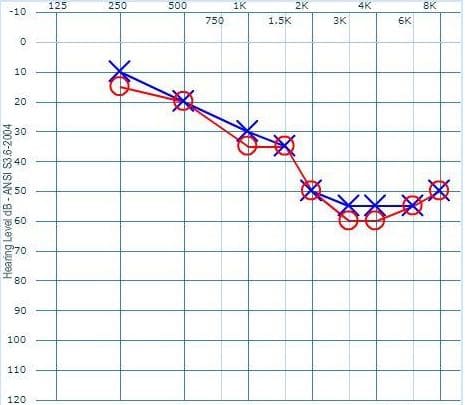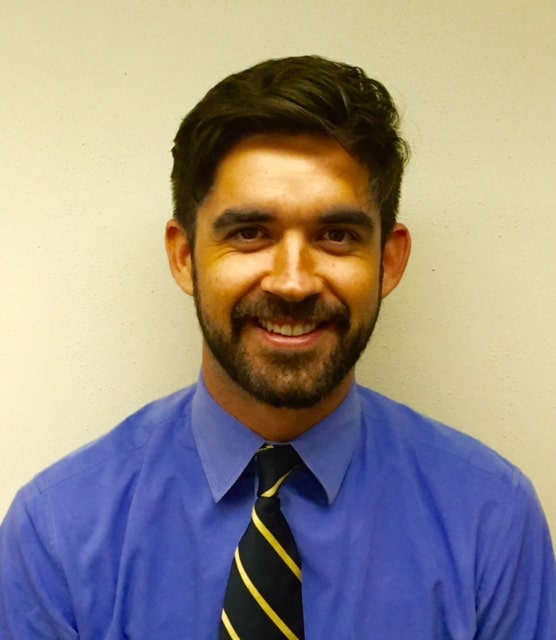By Garrett Thompson, AuD
“The Young and the RIC-less: Musings from a Millennial Audiologist” is a quarterly column by Garrett Thompson.
Garrett Thompson
Mixing it up from the normal “The Young and the RIC-less” format, this article will be more conversation than monologue. I’ll be sharing an interview with a young guy who, in bold defiance of my column’s moniker, does in fact wear RIC hearing aids. This will be the first of some patient profiles I’ll be writing for the column, as I think it’s always nice to hear from the people inside of the soundproof booth, too. I hope you enjoy.
A View From Inside the Soundproof Booth
Nico Johnson (pronounced nee-ko) and I initially crossed paths at a Memorial Day party in the Summer of 2016 hosted by a mutual friend. Hearing what I do for a living, he was quick to indicate that he has a hearing loss and show me his CICs. We chatted about hearing aids and other things, he’s an affable guy and we got along well. Fast forward six months to the next time we saw each other, at a Christmas party this time, Nico asked me if 8 years is the usual life of hearing aids and if I had any advice for getting a new pair. He was beginning to think about updating his technology, and since his previous pair was fit when he was 17, this would be the first time he navigated the process as an adult. I was happy to help, and frankly I found the whole situation interesting. Outside of my audiology circle I had never met someone my age who has hearing loss. Nico is a super nice guy, laid-back, smart, and carefree. You’d never know that he has hearing loss unless he told you, or that it was identified late in his childhood, at age five. He went to a prestigious college, has a solid career, and loyal friends. By all accounts he’s crushing it. And yet, he is very humble about the challenges he has overcome.

Nico Johnson
After assisting Nico acquire new RIC hearing aids, a transition from his CICs (we’ll get into his reaction later), I wanted to know more about Nico’s story. I asked him if he would allow me to interview him, and he said yes. While we were at it, I asked him some questions about his thoughts on OTC hearing aids and how he sees them fitting into the hearing health landscape. Watch out for his use of the term *biohacking*! Here we go!!
Garrett Thompson (GT): Hey Nico, thanks for doing this.
Nico Johnson (NJ): No problem, happy to do it, Garrett.
GT: Let’s begin at the beginning, where did you grow up and when was it discovered that you have hearing loss?
NJ: I grew up in St. Louis Park, Minnesota, and I was diagnosed with a bilateral mild-to-moderate hearing loss when I was about 5 years old. I was in preschool when my teacher told my parents she thought my speech was a bit garbled and suggested I get my hearing checked. (See Nico’s Audiogram in Figure 1 below).

Figure 1. Nico’s audiogram.
GT: Good catch by your preschool teacher! If you would, tell me about your experience wearing hearing aids as a young child.
NJ: Sure. My parents were really good about portraying hearing aids as these cool things that were going to help me learn better. Honestly, I was pretty amped about my first pair, the right one was orange with black and orange ear molds, and the left was blue, with black and blue ear molds. They were definitely not subtle!
GT: That’s awesome, I love that. I know it was a long time ago, but do you remember how you felt about having hearing aids?
NJ: Definitely—and it’s never been something me or my parents tried to sweep under the rug. I was lucky in that although I was different than the other kids, my differences have always been celebrated. The classic example in my mind happened in kindergarten—I had one of the best teachers ever. He made sure I was never made fun of for having hearing aids, and actually made all the other students think it was cool. Other kids would build little hearing aids out of legos and stick them behind their ears so they could be more like me. Looking back, it’s one of the most incredible things and I’m super lucky to have grown up in such a supportive environment.
GT: Wow, that is a great story, you clearly had great teachers and parents advocating for you. If you don’t mind sharing, did your hearing loss ever affect you socially or emotionally?
NJ: Not really, I was really lucky that no one ever made fun of me for having hearing aids. My close friends would (and still) joke about it with me, but only because I am willing to make fun of myself, too. Emotionally speaking, I was actually more interested by the fact that I was missing some things here and there, rather than really frustrated or distressed by it.
GT: It sounds like you had a great time with those bodacious orange and blue aids!
NJ: Well, I did have a bit of a rebellious phase when I wasn’t as thrilled about wearing them.
GT: Oh yeah? Tell me more about that.
NJ: It was in 7th and 8th grade, around the time when everything was confusing, I definitely didn’t wear my hearing aids as much. They certainly didn’t help when it came to flirting with girls. And I especially didn’t like having to pick up the FM system at the beginning of each day, so the hearing aids spent more time in my backpack for those couple of years. My mom knew about this and encouraged me to wear them but didn’t force me too. That was part of the reason that the next pair I got, at the end of high school, was the completely in the ear kind. I liked those a lot more and wore them all the time.
GT: Okay, so you had some ups and downs.
NJ: Definitely,but for the most part I was happy with them.
GT: Fair enough.
{Interjection…}
Nico had recently gone to the Starkey Center for Excellence, where he was fit with new premium Halo2 RICs at no cost. (He and I both appreciate that kindness very much, thank you to everyone at Starkey who made that happen). This was the first time he had worn RICs and the first time he had something on the ear since his BTEs 8 years ago in high school.
{… end of interjection}
GT: So what do you think about your new aids?
NJ: Well I was a little apprehensive about switching back to over the ear, I guess some middle school reservations crept back in. But I got over that quickly when I was told these could be controlled from my phone, and let me tell you these are a huge improvement from my previous pair. I’m blown away by how the world sounds with these things! Everything is so crisp. I like the restaurant setting, I love controlling them from my phone; I like that I can mute them directly from my iPhone if I’m working alone at my desk. I will say that the streaming is great for phone calls but not so good for music. In general though, I am overwhelmingly satisfied with the sound quality in various situations.
GT: Awesome, glad to hear that. Let’s talk about audiologists for a moment. I know you’ve worked with several in your life, from your perspective what makes a great audiologist?
NJ: It may sound cliché, but I think a great audiologist has a keen sense for what each unique patient needs. As a kid, I never really had much input on which audiologist I saw, and I’m fortunate every one I had was awesome. Now that I’m an adult and have to find one on my own, I’m going to be asking myself, “Is this somebody I’d want to work with for 5, 10, 15 years from now? Is this somebody who’s fitting a hearing aid to me, or fitting me to a hearing aid?” I think that’s an important difference.
GT: Definitely. Okay, let’s take a step back. As a person who has worn aids essentially their whole life, I’m interested to know your opinion about hearing aids in general, hearing healthcare, and how it’s changing. As an end-user of this technology, what improvements do you want to see in the future?
NJ: Honestly the sound is amazing, I’d say the user experience of the app has the greatest room for improvement. It’s kind of laggy, the streaming cuts out sometimes, and I’d like a different and better way to fine-tune them.
GT: People in the industry want to make hearing aids the next “cool” wearable technology, do you think they will ever be stylish like glasses or cool like a fitbit/smartwatch?
NJ: Yeah I think they could be, but I’m not sure what form they would take. In the end hearing is a sense that can be improved. I think the advantages of improving our biology, through so-called *biohacking*, will become self-evident and better than normal will become the new normal.
GT: Many older people hesitate to use hearing aids because of the stigma of looking old, obviously you are not affected by that, but what would you say to a person who feels that way?
NJ: Hearing aids started as an old person thing, but now everyone has something in their ears, maybe not all day but they could be soon, so I think that stigma should fade. I’ve actually experienced this firsthand with my grandfather. I don’t feel comfortable lecturing an older person but if you’ve had 70 years to become who you are and you can’t wear them at this point then apparently you have more growing up to do. My grandpa is finally wearing one, and when you ask him why he won’t wear two he says, “It’s a secret.”
GT: Hah! Spoken like a true grandpa. Well, the irony is that for some people the 70 years of identity-formation is part of why they won’t use them, they simply don’t see themselves as a person who wears hearing aids.
NJ: Yeah, I can understand that.
GT: Another major reason people don’t use hearing aids is because they don’t perceive a significant enough deficit, what do you think about that? You’ve told me you can get along reasonably well without your aids, do you think people are justified in not wanting hearing aids even if they have clinically significant hearing loss?
NJ: I think there will always be people who have no interest in partaking in the system or accepting help even where solutions exist, even for more serious conditions like cancer you have people turning down treatment. I guess that means we have that much more time to focus on people who are willing to accept the help.
GT: In terms of people using hearing aids in an over-the-counter model, how successful do you think they will be?
NJ: I don’t think they’ll be very successful, but it’s good that innovators are trying to provide more options at an affordable price point.
GT: I think there’s a fundamental question about the net effect of OTCs, tell me what you think about it. Do you think people who are unsuccessful with OTC hearing aids are more likely to react by seeking out help from a professional, or do you think they will be convinced hearing aids don’t work and delay their search for appropriate help even longer?
NJ: I think it depends a lot on socioeconomic status, people with less disposable income will be more likely to put it off until it’s absolutely necessary. It seems to me that audiologists have a vested interest in opposing OTCs, but at the same time how do they balance that with accessibility? Maybe not just accessible in a physical sense, but also in regard to providing literature on how to program OTCs at home and how to be as successful as one can be with them. There will always be some people who don’t want to see audiologists.
GT: Very interesting. Okay the last question is a bit personal: How much do you consider hearing loss to be part of your identity? Why or why not?
NJ: Well, I’m certainly cognizant of the fact that I’ve had hearing loss my whole life, but I’m always careful with identifying with it because I guess I consider myself lucky, especially in relative terms to people who have more severe hearing loss. As one example, when I went to college I visited the Office of Disabilities, they offered note-taking and other services but I never felt I needed it and didn’t end up doing it. To answer your question, I suppose my hearing loss is something I identify with, but it’s not at the core of who I am.
GT: Fair enough. Well, I don’t want to take up too much of your time, thanks again for allowing me to interview you and for your openness in sharing your story. I think the readers will enjoy it as much as I did!
NJ: No problem, the pleasure was all mine.
Tracing Nico’s story from his initial diagnosis to being a successful and delightful adult, it makes me think of the pediatric patients I’ve worked with in my young career. It makes me envision their journey to a full and happy life; I can see their prospects in Nico’s present. And I can only hope they become as resilient through adversity, as humble, and as amiable as he has.
Garrett Thompson, AuD is a clinical audiologist at Resnick Audiology in New York City. He can be reached at [email protected].








